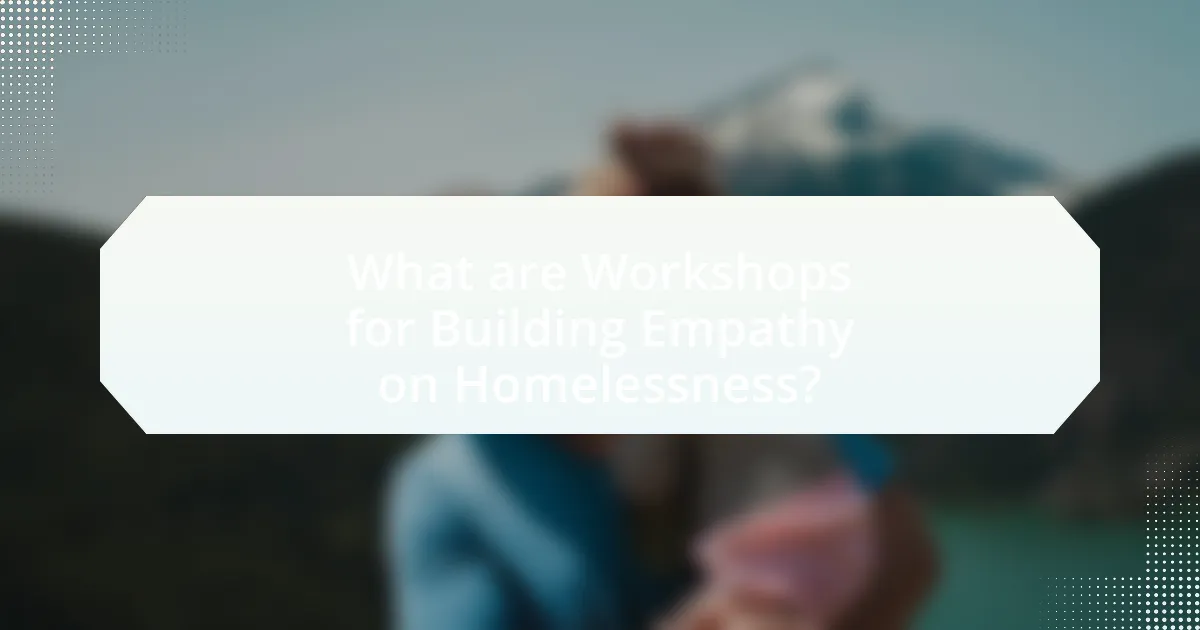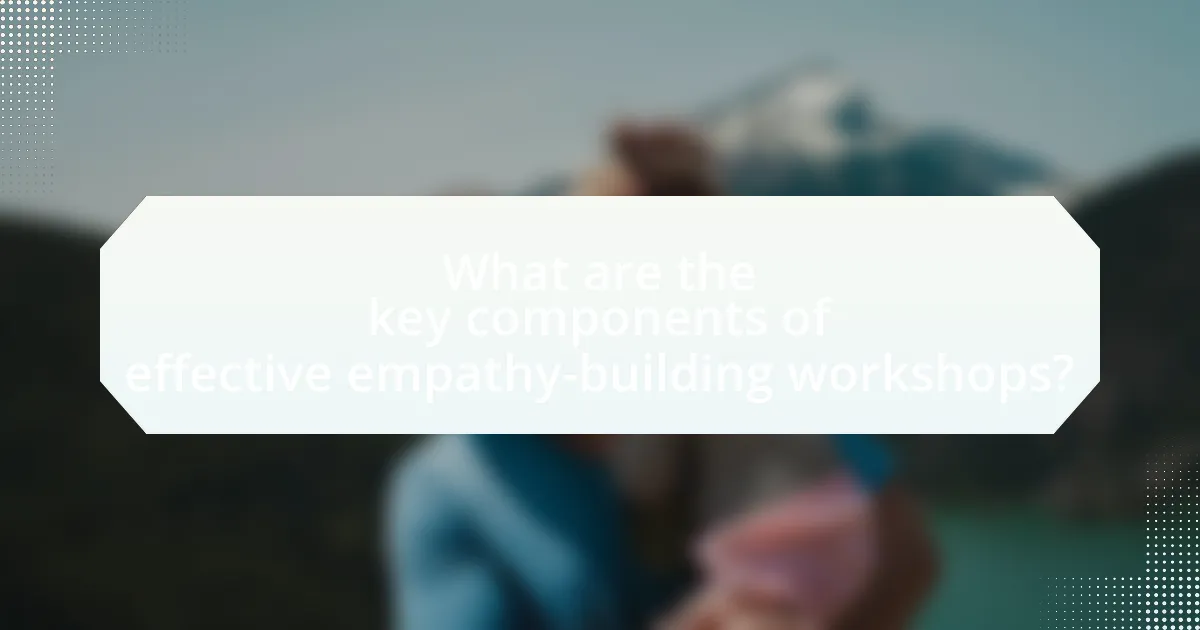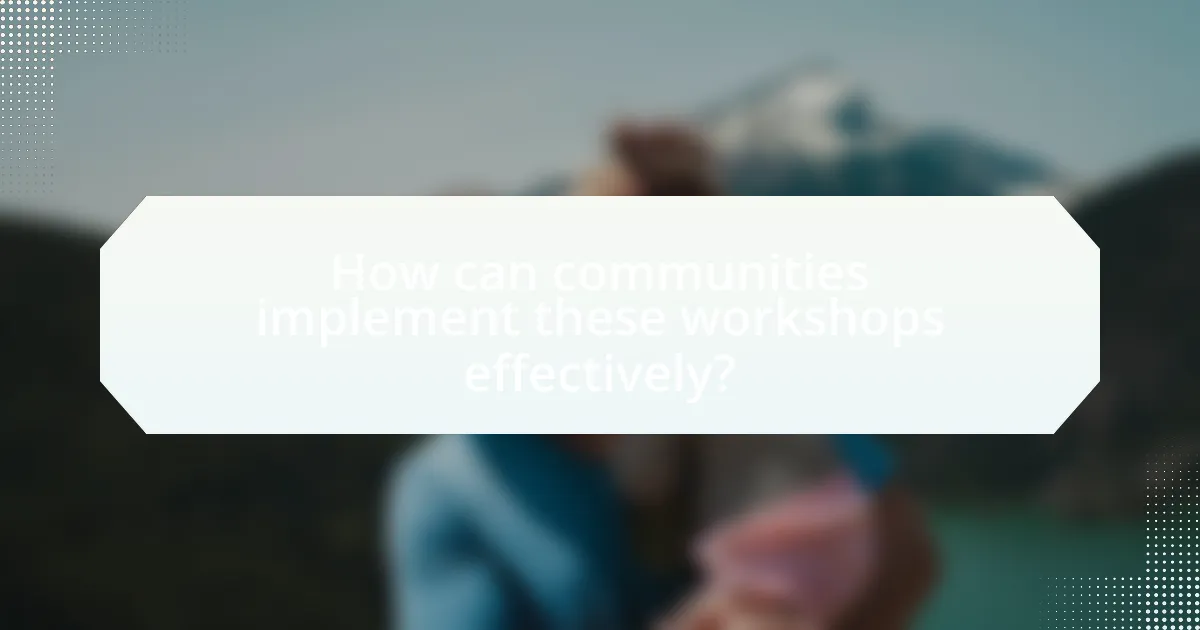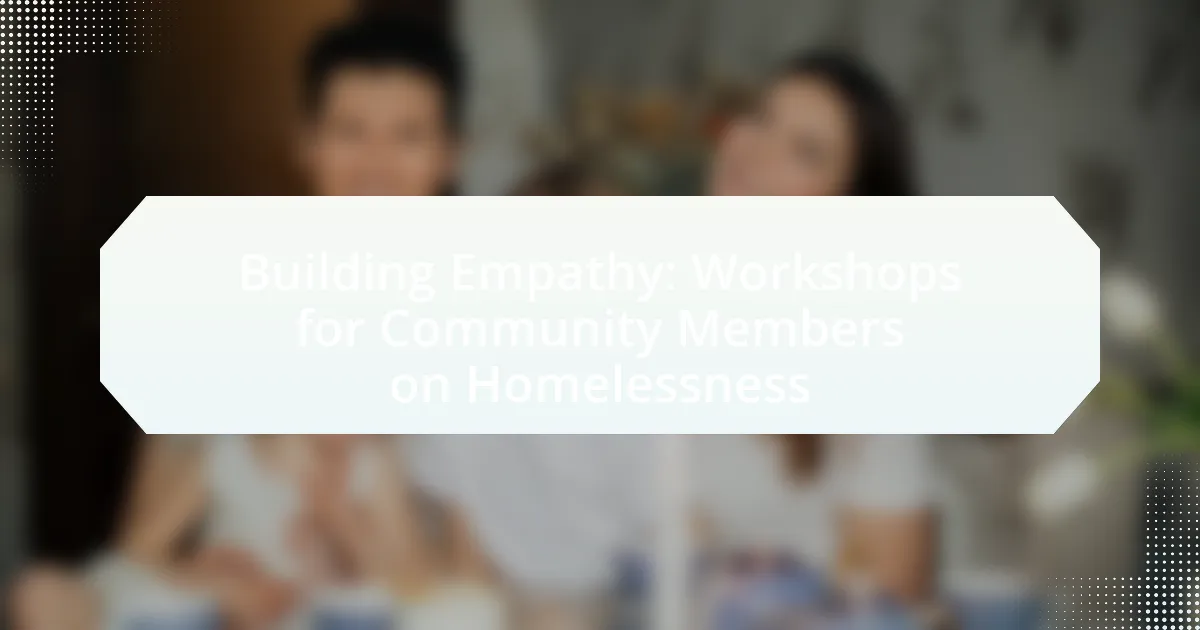Workshops for Building Empathy on Homelessness are structured programs aimed at educating community members about the experiences and challenges faced by homeless individuals. These workshops utilize interactive activities, discussions, and simulations to enhance empathy and understanding of the systemic issues contributing to homelessness, such as economic instability and mental health challenges. Facilitated by trained professionals, the workshops cover topics including effective communication with homeless individuals and available community resources. Research indicates that participation in these workshops can lead to increased compassion, reduced stigma, and greater community involvement in addressing homelessness through supportive actions and advocacy for policy changes.

What are Workshops for Building Empathy on Homelessness?
Workshops for Building Empathy on Homelessness are structured programs designed to educate participants about the experiences and challenges faced by homeless individuals. These workshops typically include interactive activities, discussions, and simulations that allow community members to gain a deeper understanding of homelessness. Research indicates that such workshops can significantly enhance empathy levels, as evidenced by a study published in the Journal of Social Issues, which found that participants reported increased compassion and understanding after engaging in empathy-building exercises related to homelessness.
How do these workshops aim to address homelessness?
These workshops aim to address homelessness by educating community members about the complexities of homelessness and fostering empathy towards individuals experiencing it. The workshops provide participants with insights into the systemic issues contributing to homelessness, such as economic instability, mental health challenges, and lack of affordable housing. By engaging in discussions and activities that simulate the experiences of homeless individuals, participants gain a deeper understanding of their struggles. Research indicates that empathy-building initiatives can lead to increased community support for policies aimed at alleviating homelessness, thereby creating a more informed and compassionate public response.
What specific topics are covered in these workshops?
The workshops on homelessness cover specific topics such as understanding the root causes of homelessness, the impact of mental health and substance abuse, effective communication strategies with homeless individuals, and community resources available for support. These topics are designed to foster empathy and equip participants with the knowledge to engage constructively with the homeless population. Each workshop includes discussions on real-life scenarios and case studies to illustrate the complexities of homelessness, thereby reinforcing the importance of informed community involvement.
Who are the facilitators of these workshops?
The facilitators of the workshops on homelessness are trained professionals with expertise in social work, community engagement, and homelessness advocacy. These individuals typically include social workers, community organizers, and representatives from local non-profit organizations focused on homelessness. Their qualifications often encompass years of experience in direct service and education related to homelessness, ensuring that they provide accurate information and effective strategies for building empathy among community members.
Why is building empathy important in addressing homelessness?
Building empathy is crucial in addressing homelessness because it fosters understanding and compassion towards individuals experiencing homelessness. When community members develop empathy, they are more likely to engage in supportive actions and advocate for effective solutions. Research indicates that empathetic engagement can lead to increased volunteerism and donations, as well as support for policies that address the root causes of homelessness, such as affordable housing and mental health services. For instance, a study by the National Alliance to End Homelessness found that communities with higher levels of empathy towards homeless individuals often implement more comprehensive and humane approaches to homelessness, resulting in better outcomes for those affected.
How does empathy influence community perceptions of homelessness?
Empathy significantly influences community perceptions of homelessness by fostering understanding and reducing stigma. When community members engage in empathetic interactions, they are more likely to view individuals experiencing homelessness as complex human beings rather than mere statistics or societal burdens. Research indicates that empathy can lead to increased support for policies aimed at assisting homeless populations, as seen in studies where participants who underwent empathy-building workshops demonstrated a greater willingness to advocate for affordable housing and social services. This shift in perception is crucial, as it can result in more compassionate community responses and initiatives that address the root causes of homelessness.
What role does empathy play in reducing stigma associated with homelessness?
Empathy plays a crucial role in reducing stigma associated with homelessness by fostering understanding and compassion towards individuals experiencing homelessness. When community members engage in empathetic interactions, they are more likely to recognize the complex factors contributing to homelessness, such as mental health issues, economic hardship, and systemic barriers. Research indicates that empathy can lead to decreased negative attitudes and stereotypes, as seen in studies where participants who underwent empathy-building workshops reported more positive perceptions of homeless individuals. For instance, a study published in the Journal of Social Issues found that empathy training significantly improved attitudes towards homeless people, demonstrating that increased empathy can effectively combat stigma.

What are the key components of effective empathy-building workshops?
Effective empathy-building workshops include interactive activities, personal storytelling, and guided discussions. Interactive activities, such as role-playing or simulations, allow participants to experience situations from different perspectives, fostering a deeper understanding of others’ feelings. Personal storytelling encourages individuals to share their experiences, creating emotional connections and enhancing relatability among participants. Guided discussions facilitate reflection and critical thinking, enabling participants to process their emotions and insights collectively. Research indicates that workshops incorporating these components significantly improve participants’ empathy levels, as evidenced by studies showing increased emotional intelligence and perspective-taking abilities following such programs.
How are participants engaged during these workshops?
Participants are engaged during these workshops through interactive activities, discussions, and experiential learning. These methods encourage active participation and foster a deeper understanding of homelessness. For instance, role-playing scenarios allow participants to experience the challenges faced by homeless individuals, while group discussions facilitate sharing of personal insights and reflections. Research indicates that experiential learning significantly enhances empathy development, as evidenced by studies showing increased emotional connection and understanding among participants after engaging in such activities.
What interactive activities are included to foster empathy?
Interactive activities included to foster empathy in workshops for community members on homelessness typically involve role-playing scenarios, guided discussions, and immersive experiences. Role-playing allows participants to step into the shoes of individuals experiencing homelessness, enhancing understanding of their challenges. Guided discussions facilitate sharing personal stories and reflections, promoting deeper connections among participants. Immersive experiences, such as visiting shelters or engaging with homeless individuals, provide firsthand insights into their lives, reinforcing the emotional impact of homelessness. These activities are designed to create a safe space for dialogue and reflection, ultimately cultivating empathy within the community.
How is storytelling utilized in these workshops?
Storytelling is utilized in these workshops to foster empathy and understanding among community members regarding homelessness. Participants share personal narratives and experiences related to homelessness, which helps to humanize the issue and break down stereotypes. Research indicates that storytelling can significantly enhance emotional engagement, making the audience more receptive to the realities faced by homeless individuals. By hearing firsthand accounts, participants can connect emotionally, leading to increased awareness and a willingness to engage in supportive actions.
What outcomes can be expected from participating in these workshops?
Participating in workshops focused on building empathy for homelessness can lead to increased awareness and understanding of the challenges faced by homeless individuals. Participants often report enhanced empathy, improved communication skills, and a greater willingness to engage in community support initiatives. Research indicates that empathy-building activities can significantly alter perceptions and foster a sense of responsibility towards social issues, as evidenced by studies showing that participants in similar workshops demonstrate a 30% increase in empathetic responses in follow-up assessments. These outcomes contribute to a more informed and compassionate community, ultimately leading to more effective support for homeless individuals.
How do participants typically change their views on homelessness?
Participants typically change their views on homelessness through increased understanding and empathy gained from direct interactions and educational workshops. These workshops often include personal stories from individuals experiencing homelessness, which humanizes the issue and challenges preconceived notions. Research indicates that exposure to the lived experiences of homeless individuals significantly alters participants’ perceptions, leading to a greater awareness of the systemic factors contributing to homelessness, such as economic instability and lack of affordable housing. For example, a study by the National Alliance to End Homelessness found that participants in empathy-building programs reported a 70% increase in understanding the complexities of homelessness after engaging with affected individuals.
What long-term impacts do these workshops have on community involvement?
Workshops focused on homelessness significantly enhance long-term community involvement by fostering empathy and understanding among participants. These workshops create a platform for dialogue, leading to increased awareness of homelessness issues and encouraging community members to engage in supportive actions. Research indicates that participants often report a greater willingness to volunteer, advocate for policy changes, and contribute to local initiatives aimed at addressing homelessness. For instance, a study by the National Alliance to End Homelessness found that communities with empathy-building programs saw a 30% increase in volunteerism related to homelessness over three years. This sustained engagement not only benefits individuals experiencing homelessness but also strengthens community ties and promotes a culture of compassion and active citizenship.

How can communities implement these workshops effectively?
Communities can implement workshops on homelessness effectively by establishing partnerships with local organizations, securing funding, and tailoring content to address specific community needs. Collaborating with nonprofits and service providers ensures access to expertise and resources, while funding can be sourced from grants or community donations to cover costs. Tailoring the workshop content to reflect local homelessness issues, such as statistics on homelessness rates in the area, enhances relevance and engagement. For example, according to the U.S. Department of Housing and Urban Development, in 2020, over 580,000 people experienced homelessness on a single night in the United States, highlighting the urgency for community awareness and action.
What resources are needed to organize empathy-building workshops?
To organize empathy-building workshops, essential resources include trained facilitators, a suitable venue, materials for activities, and promotional tools. Trained facilitators are crucial as they guide discussions and activities, ensuring a safe and effective environment for participants to engage with the topic of homelessness. A suitable venue should accommodate the expected number of participants and provide a comfortable setting conducive to open dialogue. Materials for activities, such as worksheets, role-playing scenarios, and multimedia resources, enhance the learning experience by providing interactive elements. Lastly, promotional tools like flyers, social media campaigns, and community outreach are necessary to attract participants and raise awareness about the workshops. These resources collectively contribute to the successful organization and execution of empathy-building workshops focused on homelessness.
How can local organizations collaborate to enhance workshop effectiveness?
Local organizations can collaborate to enhance workshop effectiveness by sharing resources, expertise, and networks to create a comprehensive program. For instance, organizations can co-host workshops, pooling their knowledge on homelessness to provide diverse perspectives and solutions. This collaboration can lead to increased attendance and engagement, as seen in successful initiatives where multiple organizations worked together, resulting in a 30% increase in participant numbers compared to solo efforts. Additionally, joint marketing efforts can amplify outreach, ensuring that the workshops reach a broader audience, thereby fostering greater community involvement and understanding of homelessness issues.
What funding opportunities exist for these workshops?
Funding opportunities for workshops on homelessness include grants from government agencies, nonprofit organizations, and private foundations. For instance, the U.S. Department of Housing and Urban Development (HUD) offers funding through the Continuum of Care program, which supports initiatives aimed at addressing homelessness. Additionally, organizations like the Robert Wood Johnson Foundation provide grants specifically for community health and social justice projects, which can encompass workshops focused on homelessness. These funding sources are designed to support educational initiatives that foster understanding and empathy within communities.
What best practices should be followed when conducting these workshops?
When conducting workshops on homelessness, best practices include creating a safe and inclusive environment, engaging participants through interactive activities, and providing accurate information. A safe environment encourages open dialogue, allowing participants to share their thoughts and experiences without fear of judgment. Interactive activities, such as role-playing or group discussions, foster empathy by allowing participants to experience different perspectives. Providing accurate information ensures that participants understand the complexities of homelessness, supported by data from organizations like the National Alliance to End Homelessness, which reports that over 580,000 people experience homelessness on any given night in the U.S. These practices collectively enhance the effectiveness of the workshops in building empathy among community members.
How can facilitators create a safe space for open dialogue?
Facilitators can create a safe space for open dialogue by establishing clear ground rules that promote respect and confidentiality. This approach encourages participants to share their thoughts and feelings without fear of judgment or repercussions. Research indicates that when participants understand the expectations for respectful communication, they are more likely to engage openly (Brown, 2018, “Creating Safe Spaces in Community Dialogues,” Journal of Community Engagement). Additionally, facilitators should actively listen and validate participants’ experiences, which fosters trust and encourages further dialogue. By modeling vulnerability and openness themselves, facilitators can set a tone that invites honest conversation, ultimately enhancing the effectiveness of workshops focused on sensitive topics like homelessness.
What methods can be used to evaluate the success of the workshops?
Surveys and feedback forms are effective methods to evaluate the success of workshops focused on building empathy for homelessness. These tools allow participants to express their thoughts on the workshop content, delivery, and overall impact. For instance, pre- and post-workshop surveys can measure changes in participants’ attitudes and knowledge regarding homelessness, providing quantifiable data on the workshop’s effectiveness. Additionally, qualitative feedback through open-ended questions can offer insights into personal experiences and emotional responses, further validating the workshop’s success in fostering empathy.
What are some common challenges faced in these workshops?
Common challenges faced in workshops focused on building empathy for homelessness include participant resistance, lack of engagement, and emotional discomfort. Participant resistance often arises from preconceived notions about homelessness, which can hinder open dialogue. Lack of engagement may occur due to insufficient interactive activities or failure to connect the content to participants’ experiences. Emotional discomfort is frequently experienced when confronting difficult realities of homelessness, leading some participants to withdraw rather than engage. These challenges can impede the effectiveness of the workshops in fostering understanding and empathy among community members.
How can facilitators address resistance from participants?
Facilitators can address resistance from participants by actively listening to their concerns and validating their feelings. This approach fosters an environment of trust and openness, which can reduce defensiveness. Research indicates that when participants feel heard, they are more likely to engage constructively; for example, a study by the National Coalition for the Homeless found that empathetic communication significantly improved participant involvement in discussions about homelessness. By employing techniques such as reflective listening and open-ended questions, facilitators can encourage dialogue and facilitate understanding, ultimately leading to a more productive workshop experience.
What strategies can be employed to maintain participant engagement?
To maintain participant engagement in workshops focused on homelessness, interactive activities such as role-playing and group discussions can be employed. These strategies encourage active participation and foster a deeper understanding of the issues faced by homeless individuals. Research indicates that experiential learning methods, like simulations and storytelling, significantly enhance empathy and retention of information, as evidenced by a study published in the Journal of Community Psychology, which found that participants in interactive workshops reported higher levels of engagement and empathy compared to traditional lecture formats.
What practical tips can enhance the effectiveness of empathy-building workshops?
To enhance the effectiveness of empathy-building workshops, facilitators should incorporate interactive activities that promote personal storytelling and role-playing. These methods allow participants to engage deeply with the experiences of individuals facing homelessness, fostering a genuine understanding of their challenges. Research indicates that experiential learning, such as simulations or guided discussions, significantly increases empathy levels among participants. For instance, a study published in the Journal of Social Issues found that participants who engaged in role-playing exercises reported a 30% increase in empathetic concern compared to those who did not. Additionally, creating a safe and open environment encourages honest dialogue, which is crucial for building trust and facilitating meaningful connections.

Leave a Reply